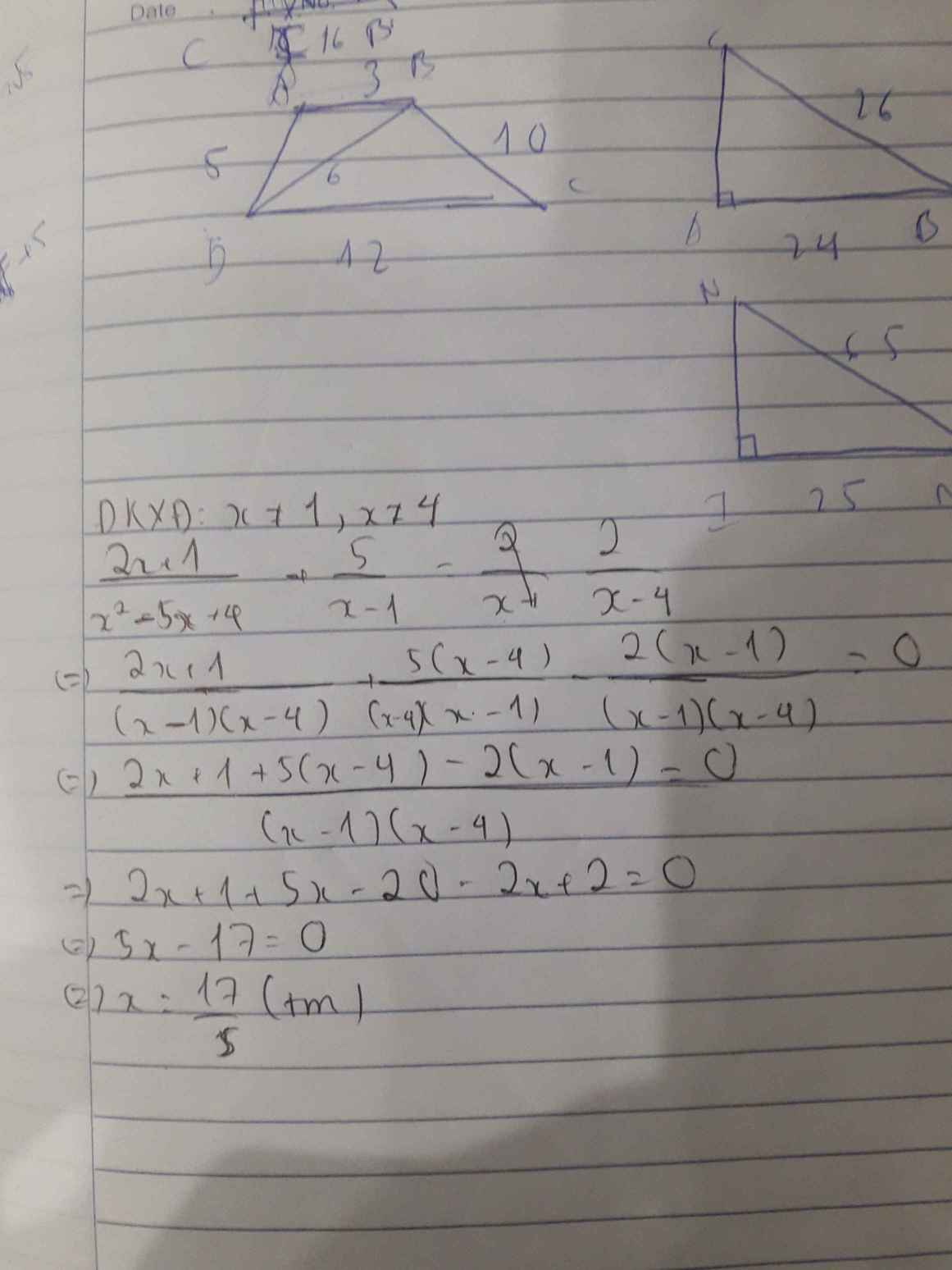
Hãy nhập câu hỏi của bạn vào đây, nếu là tài khoản VIP, bạn sẽ được ưu tiên trả lời.


`|5x| = - 3x + 2`
Nếu `5x>=0<=> x>=0` thì phương trình trên trở thành :
`5x =-3x+2`
`<=> 5x +3x=2`
`<=> 8x=2`
`<=> x= 2/8=1/4` ( thỏa mãn )
Nếu `5x<0<=>x<0` thì phương trình trên trở thành :
`-5x = -3x+2`
`<=>-5x+3x=2`
`<=> 2x=2`
`<=>x=1` ( không thỏa mãn )
Vậy pt đã cho có nghiệm `x=1/4`
__
`6x-2<5x+3`
`<=> 6x-5x<3+2`
`<=>x<5`
Vậy bpt đã cho có tập nghiệm `x<5`
aGiải phương trình |x-1|+|x-2|=|2x-3|
b)Giải phương trình 1/(x−2 )+ 2/(x−3) − 3/(x−5) = 1/(x^2 −5x+6)


TL:
ĐKXĐ:x≠1;x≠5ĐKXĐ:x≠1;x≠5
x2−3x+5x2−4x+5−x2−5x+5x2−6x+5=−14x2−3x+5x2−4x+5−x2−5x+5x2−6x+5=−14
⇔4(x2−6x+5)(x2−3x+5)−4(x2−4x+5)(x2−5x+5)+(x2−4x+5)(x2−6x+5)4(x2−4x+5)(x2−6x+5)=0⇔4(x2−6x+5)(x2−3x+5)−4(x2−4x+5)(x2−5x+5)+(x2−4x+5)(x2−6x+5)4(x2−4x+5)(x2−6x+5)=0
Từ chỗ này xuống cậu tự phân tích tử thức ròi rút gọn nhé ! Vì hơi dài nên tớ sẽ k viết.
⇔−10x3+26x2−50x+x4+25=0⇔−10x3+26x2−50x+x4+25=0
⇔x4−8x3+5x2−2x3+16x2−10x+5x2−40x+25=0⇔x4−8x3+5x2−2x3+16x2−10x+5x2−40x+25=0
⇔x2(x2−8x+5)−2x(x2−8x+5)+5(x2−8x+5)=0
^HT^

\(a,2x-5=-x+4\\ \Leftrightarrow3x=9\\ \Leftrightarrow x=3\\ b,\left(4x-10\right)\left(25+5x\right)=0\\ \Leftrightarrow\left[{}\begin{matrix}4x-10=0\\25+5x=0\end{matrix}\right.\\ \Leftrightarrow\left[{}\begin{matrix}x=\dfrac{5}{2}\\x=-5\end{matrix}\right.\\ c,\dfrac{x}{3}-\dfrac{2x+1}{2}=\dfrac{x}{6}-x\\ \Leftrightarrow\dfrac{2x}{6}-\dfrac{3\left(2x+1\right)}{6}-\dfrac{x}{6}+\dfrac{6x}{6}=0\\ \Leftrightarrow2x-6x-3-x+6x=0\\ \Leftrightarrow x-3=0\\ \Leftrightarrow x=3\)
d, ĐKXĐ:\(x\ne-2,x\ne3\)
\(1+\dfrac{x}{3-x}=\dfrac{5x}{\left(x+2\right)\left(3-x\right)}+\dfrac{2}{x+2}\\ \Leftrightarrow\dfrac{\left(x+2\right)\left(3-x\right)}{\left(x+2\right)\left(3-x\right)}+\dfrac{x\left(x+2\right)}{\left(x+2\right)\left(3-x\right)}-\dfrac{5x}{\left(x+2\right)\left(3-x\right)}-\dfrac{2\left(3-x\right)}{\left(x+2\right)\left(3-x\right)}=0\\ \Leftrightarrow\dfrac{-x^2+x+6}{\left(x+2\right)\left(3-x\right)}+\dfrac{x^2+2x}{\left(x+2\right)\left(3-x\right)}-\dfrac{5x}{\left(x+2\right)\left(3-x\right)}-\dfrac{6-2x}{\left(x+2\right)\left(3-x\right)}=0\)
\(\Leftrightarrow\dfrac{-x^2+x+6+x^2+2x-5x-6+2x}{\left(x+2\right)\left(3-x\right)}=0\\ \Rightarrow0=0\left(luôn.đúng\right)\)

b) 5x(x-2000)-x+2000=0
\(\Rightarrow5x\left(x-2000\right)-\left(x-2000\right)=0\\ \Rightarrow\left(x-2000\right)\left(5x-1\right)=0\)
\(\Rightarrow\left\{{}\begin{matrix}x-2000=0\\5x-1=0\end{matrix}\right.\Leftrightarrow\left\{{}\begin{matrix}x=0+2000\\5x=0+1\end{matrix}\right.\Leftrightarrow\left\{{}\begin{matrix}x=2000\\5x=1\end{matrix}\right.\Leftrightarrow\left\{{}\begin{matrix}x=2000\\x=\dfrac{1}{5}\end{matrix}\right.\)

ĐKXĐ: ` x ne 1 ; x ne 4`
`(2x+1)/(x^2-5x+4) + 5/(x-1) = 2/(x-4)`
`<=> (2x+1)/[(x-1)(x-4)] + [5(x-4)]/[(x-1)(x-4)] = [2(x-1)]/[(x-1)(x-4)]`
`=> 2x+1 + 5x -20 = 2x-2`
`<=> 5x = 17`
`<=> x= 17/5`(thỏa mãn ĐKXĐ)
Vậy tập nghiệm của phương trình là `S={ 17/5}`

1: Ta có: \(\dfrac{5x^2-12}{x^2-1}+\dfrac{3}{x-1}=\dfrac{5x}{x+1}\)
\(\Leftrightarrow\dfrac{5x^2-12}{\left(x-1\right)\left(x+1\right)}+\dfrac{3x+3}{\left(x-1\right)\left(x+1\right)}=\dfrac{5x^2-5x}{\left(x+1\right)\left(x-1\right)}\)
Suy ra: \(5x^2+3x-9=5x^2-5x\)
\(\Leftrightarrow8x=9\)
hay \(x=\dfrac{9}{8}\left(tm\right)\)
2: Ta có: \(\dfrac{3}{x-5}-\dfrac{15-3x}{x^2-25}=\dfrac{3}{x+5}\)
\(\Leftrightarrow\dfrac{3x+15}{\left(x-5\right)\left(x+5\right)}+\dfrac{3x-15}{\left(x-5\right)\left(x+5\right)}=\dfrac{3x-15}{\left(x+5\right)\left(x-5\right)}\)
Suy ra: \(6x=3x-15\)
\(\Leftrightarrow3x=-15\)
hay \(x=-5\left(loại\right)\)
2. ĐKXĐ: $x\neq \pm 5$
PT \(\Leftrightarrow \frac{3}{x-5}+\frac{3x-15}{x^2-25}=\frac{3}{x+5}\)
\(\Leftrightarrow \frac{3}{x-5}+\frac{3(x-5)}{(x-5)(x+5)}=\frac{3}{x+5}\)
\(\Leftrightarrow \frac{3}{x-5}+\frac{3}{x+5}=\frac{3}{x+5}\Leftrightarrow \frac{3}{x-5}=0\) (vô lý)
Vậy pt vô nghiệm.

Ta có: 5x + 3x2 = 0
<=> x(3x + 5) = 0
<=> \(\orbr{\begin{cases}x=0\\3x+5=0\end{cases}}\)
<=> \(\orbr{\begin{cases}x=0\\x=-\frac{5}{3}\end{cases}}\) Vậy S = {0; -5/3)
5(x2 - 2x) = (3 + 5x)(x - 1)
<=> 5x2 - 10x = 5x2 - 2x - 3
<=> 5x2 - 10x - 5x2 + 2x = -3
<=> -8x = -3
<=> x = 3/8 Vậy S = {3/8}
(4x + 3)2 = 4(x - 1)2
<=> (4x + 3)2 - (2x - 2)2 = 0
<=> (4x + 3 - 2x + 2)(4x +3 + 2x - 2) = 0
<=> (2x + 5)(6x + 1) = 0
<=> \(\orbr{\begin{cases}2x+5=0\\6x+1=0\end{cases}}\)
<=> \(\orbr{\begin{cases}x=-\frac{5}{2}\\x=-\frac{1}{6}\end{cases}}\) Vậy S = {-5/3; -1/6}
a) 5x + 3.x2 = 0
<=>x . ( 5 + 3x ) = 0
<=> \(\orbr{\begin{cases}x=0\\5+3.x=0\end{cases}}\)
<=>\(\orbr{\begin{cases}x=0\\z=-\frac{5}{3}\end{cases}}\)
Nghiệm cuối cùng là :{ 0;\(-\frac{5}{3}\)}
b) 5.( x2 - 2.x ) = ( 3 + 5.x ) . ( x- 1 )
<=>5.x2 - 10.x = 3.x -3 + 5.x2 - 5.x
<=> -10.x = 3.x - 3-5.x
<=> -10.x = -2.x - 3
<=> -8.x = -3
<=> x = \(\frac{3}{8}\)
Vậy x = \(\frac{3}{8}\)
c) ( 4x + 3 )2 = 4. ( x - 1 )2
<=> 16.x2 + 24.x + 9 = 4.( x2 -2.x + 1 )
<=> 16.x2+24.x + 9 = 4.x2 -8.x + 4
<=> 16.x2 +24.x + 9 -4.x2 + 8.x - 4= 0
<=> 12.x2 + 32.x + 5 = 0
<=> 12.x2 + 30.x + 2.x + 5 = 0
<=> 6.x . ( 2.x + 5 ) + 2.x + 5 =0
<=> ( 2.x + 5 ) . ( 6.x + 1 ) =0
<=> \(\orbr{\begin{cases}2.x+5=0\\6.x+1=0\end{cases}}\)
<=> \(\orbr{\begin{cases}x=-\frac{5}{2}\\x=-\frac{1}{6}\end{cases}}\)
Nghiệm cuối cùng là : { \(-\frac{5}{2};-\frac{1}{6}\)}


bằng 5 nhé
\(2.\left(x-5\right)\left(x+2\right)=x^2-5x\)
\(\Leftrightarrow2.\left(x^2+2x-5x-10\right)=x^2-5x\)
\(\Leftrightarrow2x^2+4x-10x-20=x^2-5x\)
\(\Leftrightarrow2x^2-x^2+4x-10x+5x-20=0\)
\(\Leftrightarrow x^2-x-20=0\)
\(\Leftrightarrow x^2-5x+4x-20=0\)
\(\Leftrightarrow x.\left(x-5\right)+4.\left(x-5\right)=0\)
\(\Leftrightarrow\left(x+4\right).\left(x-5\right)=0\)
\(\Leftrightarrow\orbr{\begin{cases}x+4=0\\x-5=0\end{cases}\Leftrightarrow\orbr{\begin{cases}x=-4\\x=5\end{cases}}}\)
Vậy....